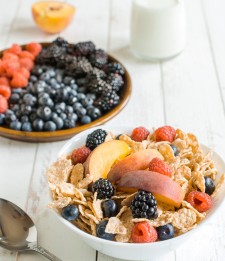 Before breakfast in most homes today, children have already made many choices. Choices like what to wear, how to wear it, what to look at as they get ready for the day, how they do their hair, etc. They then get to breakfast and they get given a myriad of choices to make as to whether they want cereal and what kind, toast and what goes on it and even how it is cut.
Before breakfast in most homes today, children have already made many choices. Choices like what to wear, how to wear it, what to look at as they get ready for the day, how they do their hair, etc. They then get to breakfast and they get given a myriad of choices to make as to whether they want cereal and what kind, toast and what goes on it and even how it is cut.
I believe that we create a lot of issues and behaviour problems for our kids by giving them too many choices. They have too much ‘power’ over their lives at too young an age when they don’t yet know how to steward that ‘power’.
Have you ever reached the end of the day and you pop into the supermarket to pick up something and you are bombarded with the cereal aisle or the hair shampoo or skin care range, let alone the bread aisle with the multitude of varieties now available. I sometimes get to the point of saying “Please don’t ask me to make a decision. I don’t want to make another decision today!!”
When we were younger, we didn’t have all the supermarket choices that are now available today. It was simple. The ‘choice’ was easier. This or that. Now it is twenty different kinds of this. We become overwhelmed.
The same with our kids. When I was young, you had one choice for breakfast – toast. Actually, two choices in winter – porridge or toast. We didn’t get a choice on how to cut it or my parents working out ways to ‘tempt’ me to eat it. You either ate it or went hungry. Bad luck. No pandering to my whims of I’m not quite ready to eat it yet or I don’t feel like that today.
Perhaps we are giving our kids too many choices and creating problems for them with too much responsibility too young. We then wonder why there are so many behavioural issues.
My kids did not get many choices on when to eat, if to eat or what to eat. It was meal-time and it was put in front of them. You came to the dinner table when you were called and you all ate together. Parents – this is important.
One of the best pieces of advice I received when my children were babies was to have a basket with 3 toys in it. When they were able to sit upright but couldn’t crawl, we had a basket with 3 toys in it and we would get 1 or 2 toys out of the basket and place these toys in front of them. The children were able to focus and would happily sit and play with those toys. We would regularly change those toys every few days or weekly and put those 3 toys away and bring out another 3 toys. This actually assisted their play as they didn’t have too many choices to make. They could be focussed and not overwhelmed. Whenever we happened to put out too many toys at the one time, the children wouldn’t focus on any one toy but would soon become distracted and unhappy and want attention.
As the children have grown older, I still see a similar pattern. When they have too much on their ‘plate’ or have too much homework or are stressed about a lot of things coming up, they tend to dither and waste time stressing about it and then tend to not achieve any of the activities or homework. A similar pattern still seems to exist with their toys. If there are too many choices, they don’t tend to really play with any one item but tend to float from one item to another without really maximising the benefit of any one toy, game, book etc.
It not only affects their behaviour but it also affects their decision making. A number of years ago, we noticed among a number of the young adults in our church that they wouldn’t commit to an activity until the very last minute. They were always waiting in case a ‘better opportunity’ came along.
Sure, we need to enable our children to grow into healthy adults capable of making wise decisions but please do not give them too many choices or too much responsibility in making choices too young. One of the key indicators of this is when they start saying, “I don’t want that”. This can be a great indicator that perhaps you need to cut back on the amount of choices your child is making and take back some of the responsibility as a parent.
I would love to hear your thoughts.